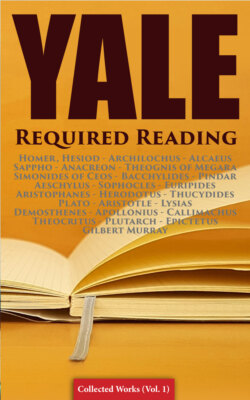Читать книгу Yale Required Reading - Collected Works (Vol. 1) - Anacreon - Страница 110
На сайте Литреса книга снята с продажи.
The Life and Work of Archilochus
ОглавлениеTable of Contents
ARCHILOCHUS of Paros (fl. 650 B.C.?) eclipsed all earlier writers of the iambus, and counts in tradition as the first. He was the 'Homer' of familiar personal poetry. This was partly due to a literary war in Alexandria, and partly to his having no rivals at his side. Still, even our scanty fragments justify Quintilian's criticism: "The sentences" really are "strong, terse, and quivering, full of blood and muscle; some people feel that if his work is ever inferior to the very highest, it must be the fault of his subject, not of his genius." This has, of course, another side to it. Archilochus is one of those masterful men who hate to feel humble. He will not see the greatness of things, and likes subjects to which he can feel himself superior. Yet, apart from the satires, which are blunt bludgeon work, his smallest scraps have a certain fierce enigmatic beauty. "Oh, hide the bitter gifts of our lord Poseidon!"is a cry to bury his friends' shipwrecked corpses. "In my spear is kneaded bread, in my spear is wine of Ismarus; and I lie upon my spear as I drink!"That is the defiant boast of the outlaw turned freebooter. "There were seven dead men trampled under foot, and we were a thousand murderers." What does that mean? One can imagine many things. The few lines about love form a comment on Sappho. The burning, colourless passion that finds its expression almost entirely in physical language may be beautiful in a soul like hers; but what a fierce, impossible thing it is with this embittered soldier of fortune, whose intense sensitiveness and prodigious intellect seem sometimes only to mark him out as more consciously wicked than his fellows! We can make out something of his life. He had to leave Paros -- one can imagine other reasons besides or before his alleged poverty -- and settled on Thasos, "a wretched island, bare and rough as a hog's back in the sea,"in company with all the worst scoundrels in Greece. In a battle with the natives of the mainland he threw away his shield and ran, and made very good jokes about the incident afterwards. He was betrothed to Cleobûlê, the daughter of a respectable Parian citizen, Lycambes. Lycambes broke off the engagement; Archilochus raged blindly and indecently at father and daughter for the rest of his life. Late tradition says they hanged themselves. Archilochus could not stay in Paros; the settlement in Thasos had failed; so he was thrown on the world, sometimes supporting himself as a mercenary soldier, sometimes doubtless as a pirate, until he was killed in a battle against Naxos. "I am a servant of the lord god of war, and I know the lovely gift of the Muses."He could fight and he could make wonderful poetry. It does not appear that any further good can be said of him.
